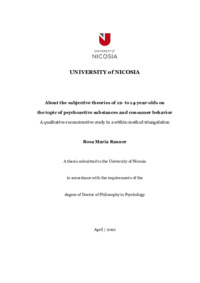- Ranner, Rosa Maria
- School of Humanities and Social Sciences |
- Department of Social Sciences
- May 2021
- English
- 255 pages
- Hager, Elisabeth | Kogler, Alois | Juen, Barbara
- School-aged children and adolescents | Addiction prevention | Subjective theories | Health research | Development research | Health literacy | Within-method triangulation | Individual interviews | Focus groups
- Social science -- Psychology
-
-
The rapidly growing number of scientific publications about substance use and addiction prevention shows that this research area has established itself in recent years as important for health and development research. Based on the subject of addiction prevention, the present study examines 12- to 14-year-olds in the so-called entry and risk age for initial and experimental use of psychoactive substance and discusses their perspectives, attitudes and subjective theories in a focus group. The focus of the present research lies in describing and understanding a reflexive examination of the experience, behavior and perception of individual cases and case groups as well as the combination of different qualitative methods. Two qualitative-reconstructive methods are combined in a within-method triangulation and in a sequential design. In the first part of the study 16- to 20-year-olds were interviewed in semi-structured individual interviews. The sample were recruited from the field and consisted of three comparison groups including adolescents and young adults who are already under treatment due to an addiction disease, those who use consulting addiction prevention services and adolescents who claimed to have little or no experience in using psychoactive substances. From the findings of these interviews, short life-stories in the form of Empirical Vignettes were developed to serve as the main information input and stimulus material for the second part of the study, the focus group project in the age-cohort of 12- to 14-year-olds. The main achievement of the analysis were the In Vivo Codes and the reconstruction of the subjective theories of the respondents as well as possible interdependencies. Using the method of Codified Content Analysis, a category system with a total of nine maincategories and 76 subcategories and sub-subcategories was the outcome. The research findings contribute to the existing addiction prevention and the concept of the health literacy of school-aged children and adolescents as well as the use of qualitative-reconstructive methods
-
-
-
Die schnell wachsende Zahl von wissenschaftlichen Publikationen zum Thema Substanzkonsum und Suchtprävention zeigt, dass sich dieser Forschungsbereich in den letzten Jahren als bedeutsam für die Gesundheits- und Entwicklungsforschung etabliert hat. Ausgehend vom Gegenstand der Suchtprävention werden in dieser Studie 12- bis 14-jährige Jugendliche im sogenannten Einstiegs- und Risikoalter für Substanzkonsum befragt und ihre Sichtweisen, Einstellungen, Denkweisen und subjektiven Theorien in einer Fokusgruppe diskutiert. Erforscht wird, wie Jugendliche dieser Altersgruppe über psychoaktive Substanzen und Konsumverhalten denken, was sie darüber wissen und wie sie dazu stehen. Durch die Within-Method-Triangulation und die Kombination zweier qualitativer konstruktiver Methoden werden unterschiedliche Perspektiven in einem sequenziellen Design untersucht. In der ersten Teilstudie werden 16- bis 20-Jährige in Einzelinterviews befragt. Das Sample erschließt sich im Feld und besteht aus drei Vergleichsgruppen, Jugendliche und junge Erwachsene, die wegen einer Abhängigkeitserkrankung bereits in stationärer Behandlung sind, jene, die das Angebot von ambulanten Drogenberatungsstellen wahrnehmen, und Jugendliche, die angeben, wenig bis keine Erfahrung mit psychoaktiven Substanzen zu haben. Aus den Ergebnissen der Einzelinterviews werden empirische Vignetten erstellt, die im zweiten Forschungsteil als Informationsinput für das Fokusgruppenprojekt dienen. Die Ergebnisse erschließen sich durch die Auswertung der Fokusgruppen mit den Mitteln der codifizierten Inhaltsanalyse. Im Zentrum der Auswertung stehen die In-Vivo-Codes aus insgesamt neun Hauptkategorien mit gesamt 76 Subkategorien und die Rekonstruktion der Realitäten der Befragten sowie möglicher Wirkungszusammenhänge. Das Forschungs- und Erkenntnisinteresse richtet sich vor allem auf das Beschreiben und Verstehen sowie eine reflexive Auseinandersetzung mit dem Erleben, Verhalten und der Wahrnehmung von Einzelfällen und Fallgruppen sowie die Zusammenführung der beiden Teilstudien durch Triangulationsdesign. Die Forschungsergebnisse leisten einen Beitrag zur bestehenden Suchtprävention und zum Konzept der Gesundheitskompetenz Jugendlicher einerseits und zur Anwendung qualitativ-rekonstruktiver Methoden andererseits.
-
About the subjective theories of 12- to 14-year-olds on the topic of psychoactive substances and consumer behavior A qualitative-reconstructive study in a within-method triangulation
| Type | Location | Link |
|---|---|---|
| dissertation | [More information] |

